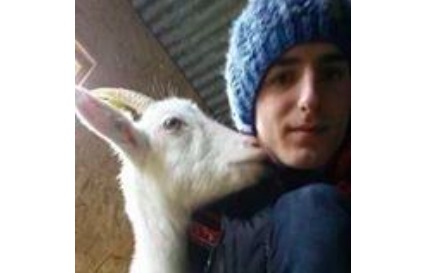. . SUSTAINABLE DEVELOPMENT . .
An interview for CPNN by Kiki Chauvin
I made the following interview with Armand G., 18 years old, who wants to become a farmer on a small scale. His plans are against the trend towards the disappearance of small farms in France. Between 1970 and 2010, according to INSEE, the average size of farms in France has increased from 21 to 55 hectares. But in the same period, the number of farms has dropped from 1,600.000 to 510,000!

Question: Why do you prefer to create a small rather than a large farm on the current models?
“I was born into a family of farmers and I am immersed in this universe since childhood. The animals are familiar to me; they became my friends and accomplices. The large farms, large structures do not interest me. I’m looking to create a small farm rehabilitating a simple and healthy lifestyle by developing the artisanal side of farming. I hope to raise goats, and also have some cows. I would like to make cheese and sell it in the markets, offering good farm products. It would be nice to enjoy a high quality of life while rediscovering traditional manufacturing methods, old, for me and for the people who consume my products. I do not think ‘get rich’ but a living while respecting the environment and nature in general. I want to create a farm of human dimensions. ”
Question: Do you have contact with others who think like you?
“I had the opportunity to travel to the USA; I had the chance to visit some farms. The size of some farms, including herds of thousands of animals, shocked me and strengthened my desire to have a small operation! In these industrial farms, the animal is only a commodity that pays. However, I also had the pleasure of meeting people from small farms of only a few hectares (with goats, cows and sheep) where there is not at all the same spirit. There is more contact, friendliness, humanity; they speak of the pleasure found in their work! As breeders they are close to their animals, they have more time to devote to the herd, which creates a shared trust and which facilitates quality work. They combine their work with the manufacture of diversified products (cheese, yoghurt, butter, weaving, tailoring and handicrafts).
“One can work alone every day, but in this new mindset one rediscovers mutual aid and solidarity.
“It is the difference between the spirit of local markets and the world of supermarkets and name brands!
“In France, I use Facebook as a link with other breeders from different regions who give me advice as I learn my trade. So far i have two goats and three young kids. ”
(Article continued on the right column)
(Article continued from the left column)
Question: What are the consequences of the state subsidies paid to large farms?
“The subsidies are paid in proportion to the size of the operation, which means that a large farm will get the most, while the small farmer, the person who needs it most, will have nothing!
“When the big enterprise gets financial aid, it is more likely to invest in equipment that is more ‘efficient’, tending beyond mechanization to robotization. All this develops a different relation between the quality of work and the quality of production! What matters is competition and profit.
“At the same time, the farmer becomes hostage to big brands, such as Danone, Senoble …, and plant protection products such as those of Monsanto.
“In conclusion, I am convinced that we can return to a real quality of work in the operation of a small farm with simple values. For me, I see a future in the breeding of goats with a return to respect for the earth. I became aware of the danger of robotics; I think we need to remain at the level of mechanization that serves to relieve and brings comfort to the daily work of farming which is very physical. As I have said, we need to return to an agriculture on a more human scale.”